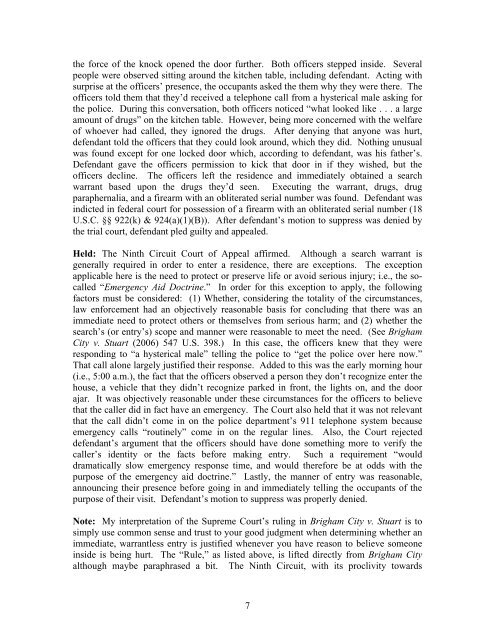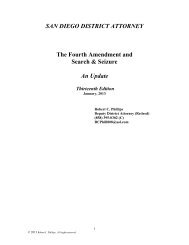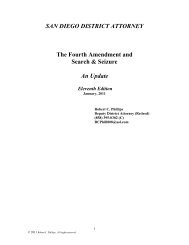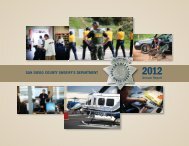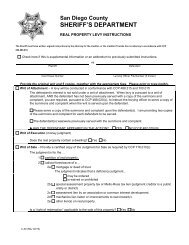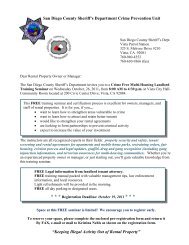San Diego District Attorney - San Diego County Sheriff's Department
San Diego District Attorney - San Diego County Sheriff's Department
San Diego District Attorney - San Diego County Sheriff's Department
Create successful ePaper yourself
Turn your PDF publications into a flip-book with our unique Google optimized e-Paper software.
the force of the knock opened the door further. Both officers stepped inside. Several<br />
people were observed sitting around the kitchen table, including defendant. Acting with<br />
surprise at the officers’ presence, the occupants asked the them why they were there. The<br />
officers told them that they’d received a telephone call from a hysterical male asking for<br />
the police. During this conversation, both officers noticed “what looked like . . . a large<br />
amount of drugs” on the kitchen table. However, being more concerned with the welfare<br />
of whoever had called, they ignored the drugs. After denying that anyone was hurt,<br />
defendant told the officers that they could look around, which they did. Nothing unusual<br />
was found except for one locked door which, according to defendant, was his father’s.<br />
Defendant gave the officers permission to kick that door in if they wished, but the<br />
officers decline. The officers left the residence and immediately obtained a search<br />
warrant based upon the drugs they’d seen. Executing the warrant, drugs, drug<br />
paraphernalia, and a firearm with an obliterated serial number was found. Defendant was<br />
indicted in federal court for possession of a firearm with an obliterated serial number (18<br />
U.S.C. §§ 922(k) & 924(a)(1)(B)). After defendant’s motion to suppress was denied by<br />
the trial court, defendant pled guilty and appealed.<br />
Held: The Ninth Circuit Court of Appeal affirmed. Although a search warrant is<br />
generally required in order to enter a residence, there are exceptions. The exception<br />
applicable here is the need to protect or preserve life or avoid serious injury; i.e., the socalled<br />
“Emergency Aid Doctrine.” In order for this exception to apply, the following<br />
factors must be considered: (1) Whether, considering the totality of the circumstances,<br />
law enforcement had an objectively reasonable basis for concluding that there was an<br />
immediate need to protect others or themselves from serious harm; and (2) whether the<br />
search’s (or entry’s) scope and manner were reasonable to meet the need. (See Brigham<br />
City v. Stuart (2006) 547 U.S. 398.) In this case, the officers knew that they were<br />
responding to “a hysterical male” telling the police to “get the police over here now.”<br />
That call alone largely justified their response. Added to this was the early morning hour<br />
(i.e., 5:00 a.m.), the fact that the officers observed a person they don’t recognize enter the<br />
house, a vehicle that they didn’t recognize parked in front, the lights on, and the door<br />
ajar. It was objectively reasonable under these circumstances for the officers to believe<br />
that the caller did in fact have an emergency. The Court also held that it was not relevant<br />
that the call didn’t come in on the police department’s 911 telephone system because<br />
emergency calls “routinely” come in on the regular lines. Also, the Court rejected<br />
defendant’s argument that the officers should have done something more to verify the<br />
caller’s identity or the facts before making entry. Such a requirement “would<br />
dramatically slow emergency response time, and would therefore be at odds with the<br />
purpose of the emergency aid doctrine.” Lastly, the manner of entry was reasonable,<br />
announcing their presence before going in and immediately telling the occupants of the<br />
purpose of their visit. Defendant’s motion to suppress was properly denied.<br />
Note: My interpretation of the Supreme Court’s ruling in Brigham City v. Stuart is to<br />
simply use common sense and trust to your good judgment when determining whether an<br />
immediate, warrantless entry is justified whenever you have reason to believe someone<br />
inside is being hurt. The “Rule,” as listed above, is lifted directly from Brigham City<br />
although maybe paraphrased a bit. The Ninth Circuit, with its proclivity towards<br />
7


